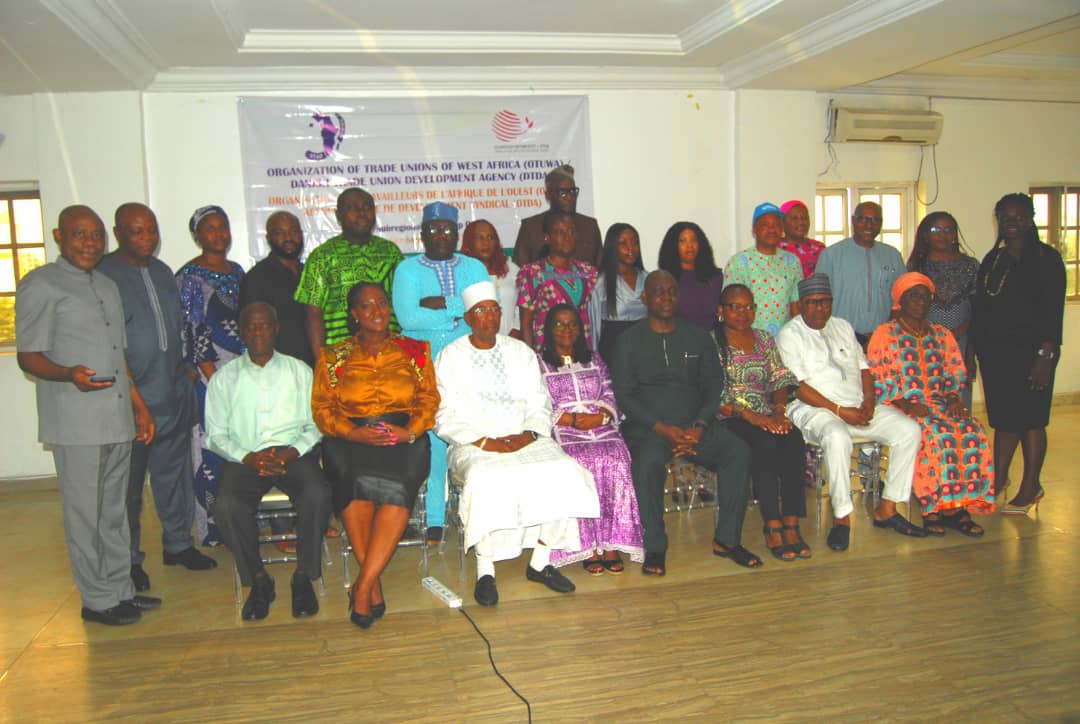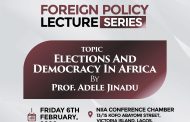How might a severely climate change threatened continent guarantee the social protection that can make the energy transition from fossil fuel a just transition in the face of unspeakable socio-economic, political and security challenges? This was the puzzle the Organisation of Trade Union of West Africa (OTUWA) along with the Danish Trade Union Development Agency (DTDA) put on the table at its recent Regional Workshop on climate change in Abuja.
In terms of size, it was a small audience from INGOs, labour, inter-governmental organisations and researchers from over a dozen West African countries. But it was a compact and active audience dominated by articulate women leaders and their interesting mastery of the language of climate change politics.
 For one, the messages of solidarity from the DTDA, ILO, NLC and OTUWA Presidency were not the flowery, solidaristic incantations usually dumped on hostage listeners but sharp stress in each case on the imperative of the labour movement positioning itself to lead the negotiations of climate change from an informed analysis of what is at stake. What is at stake for DTDA, for example, is developing labour towards the analytical vigour to produce a climate friendly outcome for the most vulnerable elements in the society, most of whom are covered by the conception of labour beyond workers in classical industrial sites.
For one, the messages of solidarity from the DTDA, ILO, NLC and OTUWA Presidency were not the flowery, solidaristic incantations usually dumped on hostage listeners but sharp stress in each case on the imperative of the labour movement positioning itself to lead the negotiations of climate change from an informed analysis of what is at stake. What is at stake for DTDA, for example, is developing labour towards the analytical vigour to produce a climate friendly outcome for the most vulnerable elements in the society, most of whom are covered by the conception of labour beyond workers in classical industrial sites.
In stressing analysis backed positioning, they were memorializing the tough journey of the climate negotiation, especially the debate on who bears the material/financial costs of climate change inspired energy transition. The seductive initial framing of the debate in terms of those who caused the pollution through industrial revolution being the right people to pay suffered bruises from the scholarly punches from Oxford University’s Prof Simon Caney in particular. Soon, it could be heard whether holding living Westerners responsible for the ‘sins’ of their ancestors makes sense, especially if it could not be proved that the ancestors knew that industrialisation would produce a climate change outcome and, lastly, when even those outside the West also benefitted from industrial civilisation propelled by the industrial revolution.
Kingsley Ofei-Nkansah and Adagbo Onoja, the two paper presenters at the OTUWA Regional Workshop argued that climate colonialism argument was what has settled the stalemate in the negotiation of who pays for climate change. In Onoja’s argument, climate colonialism resolved the stalemate in the sense that after the 6th report of the Inter-Governmental Panel on Climate Change (IPCC) formally referenced/recognised climate colonialism narrative in 2022, there was nothing that powerful opponents of climate colonialism, particularly the United States, could do to halt it. Not even the empirically inviting standpoint of some notable British columnists who knocked at ‘polluters pay’ argument, citing Third World countries good at cutting down trees which they say have nothing to do with climate colonialism, could help antagonists of climate colonialism.
Climate colonialism is the argument that climate change is an outcome of colonialism arising from its “dispossession, displacement, disruption of food production, water and local space management systems leading to pollution, degradation, deforestation and damaged health delivery system from India to Africa, Australia, North America, Latin America and the Caribbean”. This was the fascinating discourse unfolded by ideologues and political leaders of indigenous victims of colonial practices of power against the environment in small states around the Pacific Ocean. The leader of one of those states was a one-man spectacle at the COP in Glasgow in 2021. Boosted by global civil society platforms, they further asserted that “The long duration of direct and indirect colonialism has been such that the management of nature by Empire manifested in vast mines, desecrated rivers, emaciated territories following from the clearing of mangroves, grasslands, rainforests, and wetlands across continents in favour of quarries, plantations, ranches, roads and railways. This process is what underlays the structural outcomes of uncontrollable floods, drought and famine crises across Africa, Asia, the Caribbean and Latin America today”
It turned out an unstoppable argument which the goliaths opposing it since Paris Conference in 2015 caved in to, a remarkable victory for discourse and power in international politics. Aalthough putting it in the COP and UN documents doesn’t automatically mean implementation, what is, however, important from that victory is how coming in from informed position is what transnational advocacy groups need to master.
 For, by posing climate change as an outcome of colonialism, it brilliantly shifted the question of who should pay from the clumsy ‘polluters pay’ analogy to the sharper frame game of colonialists paying. Or, how it would be unjust for victims of colonialism – workers, peasants, professionals, urban poor – to bear the cost of the transition from fossil fuel to newer energy forms such as sun, water, wind.
For, by posing climate change as an outcome of colonialism, it brilliantly shifted the question of who should pay from the clumsy ‘polluters pay’ analogy to the sharper frame game of colonialists paying. Or, how it would be unjust for victims of colonialism – workers, peasants, professionals, urban poor – to bear the cost of the transition from fossil fuel to newer energy forms such as sun, water, wind.
Energy transition as an involving concept was explicated to the audience in terms of the imperative for re-orientation from dirty energy (fuel, coal, wood) to clean energy (wind, water and sun), a difficult task after over three centuries of fossil energy. It will be complicated for giant transnational corporations and their engineers, designers, managers of energy security in terms of routes and supply chain and rule writers of global geopolitics just as it would be tasking for the urban poor, peasants, workers, women, informal economy operators and other disadvantaged elements, particularly in Africa.
Although the transition will create new jobs in areas such as agriculture, manufacturing, engineering and technology, much of these would be so concentrated in the places of least displacement of workers, resulting in enlarged unemployment. As employment determines income stability, savings and investment at all levels of investment (from artisans to small scale entrepreneurs to mega corporations), aggravated job losses in any region portends grave dangers to well-being, peace and stability. It can get worse with green energy transition’s approval of removal of subsidy on fossil products, an action which comes with implications such as rise in inflation and significant job losses arising from discontinuation of coal mines or the use of wood energy among peasant farmers. These impacts do not include climate shocks and the threatening humanitarian crisis implied.
This background makes social protection of those most vulnerable to climate change shocks an imperative, argued the presenters. But will social protection come just because the UN, ILO, G-8, COP and global civil society say so? Not many think so. There is no doubt about it that the UN, the ILO, the global civil society platforms and, of course, the global negotiation of climate change (the COP series) have produced a substantial bunch of social protection checklist. These range from, to quote one of the papers:
- climate smart agricultural practices such as climate resilient seeds or livestock breeds
- efforts directed at climate early warning systems so that people are not caught off guard by climate catastrophes such as flood, drought or conflict-determined forced migration;
- technical or trade specific training programmes that enable vulnerable groups in the energy sector to transit from old energy orientations and practices to newer ones as the technology and ways of delivering fuel give way to those of newer forms of energy
- the provision of ‘grey infrastructure’ to specifically identified communities of vulnerability
- attention to anticipatory adaptation measures such as insurance or emergency cash transfers which enable recovery in post-shock circumstances
- the theory and practice of resilience such that ability to overcome shocks are imbibed by children, women and other disadvantaged elements instead of leaving them to think that climate catastrophes are the anger of the gods/ancestors
- the instrumentality of public works in terms of cushioning impacts by securing income for the most vulnerable through the post-shock reconstruction process. This scenario tends to agree with Adam Smith’s argument that the people can be paid for sweeping the streets in certain circumstances.
- inclusive climate shock management strategies that can remove bureaucratic bottlenecks and make rapid response quick and direct because such a strategy has benefitted from insights other than those of bureaucrats.
- the primacy of deployment preparation which means how important it is to have a social registry, for instance, complete with updated information about potentially vulnerable elements, making it easier and quicker to reach them in the event of a climate emergency.
- the centrality of a conscious programme of alignment of behavioral patterns of vastly vulnerable groups with the demands of a Green economy, mostly through public enlightenment, short terms formal training programmes and skills updating opportunities in communities
- The Pentagon own paradigm of social protection from climate change risks regarding its thousands of military bases around the world, the installations there as well as troops.

(L – R) Cde Adeyemi of NASU, Kingsley Ofei-Nkansah at the back, Adagbo Onoja, a paper presenter and Favour Tony of CDD West Africa
The challenge for OTUWA and other civil society organisations is, however, identified in terms of transcending existing checklist and producing their own. This would be in tandem with the wisdom that who gets to define a problem is more important than the problem itself. Doing so enables them to create the set of power relations within which they could decide the authoritative allocation of values or determine the who gets what, when and how question. It is power relations that makes possible any set of actions that will protect social categories and groups that would ordinarily be unjustly treated if such protections are not there or are there but insensitively framed.
The audience heard how beautiful concepts such as regulation, transparency and accountability have no permanent meaning and their appearance in inter-governmental documents do not automatically promise anything as every such scripts are always for someone and for some purpose, a phrase made popular by Robert Cox, himself a former ILO boss. “The lessons to be learnt from how Loss and Damage Fund was eventually inserted into climate negotiations is that advocacy and campaigning is the point of departure for social protection politics of OTUWA and its members”, said Onoja who itemised how the language game could take OTUWA that far:
- Standpoint advocacy that takes advocacy beyond the black box of social protection. This is because the over 2 million who die from accumulated inhaling of firewood smoke and indoor/outdoor cooking do not inhabit the same social protection universe as those who die from non-communicable diseases associated with excessive consumerism;
- The rejection of the theory and practice of resilience in the politics of social protection because it is all a clever way of transferring the burden of coping with the vagaries of climate change to the people by grooming them into psychological and other responsibilities for their own survival in the event of climate shocks.
- Taking coalition building seriously
- Taking collective action seriously as communities of vulnerability would one day need to press home the case for addressing a climate change peculiarity by street action
A discourse – power approach for OTUWA was further justified with how mother earth has demonstrated the recklessness of climate change denialism. It has been such that even giant transnational corporations and status quo political parties spearheading denialism are now moving in the reverse gear because no part of the world is safe from the onslaught of what have been variously captured as climate change, climate cataclysm, climate catastrophic, climate hell and more. When leading stakeholders such as the Pentagon are firmly in the climate change train (it recognised in 2014 the dangers of climate change to its thousands of military bases around the world amongst others), Africa cannot go to sleep.

Climate justice for (West) Africa required
Although Africa generate less than 5% of the emission heating up climate conditions generating powerful flooding, desertification, heatwaves, forced migration and associated violent inter-group relations, the entire continent has the weakest capacity for managing climate shocks. Most of Africa have very weak and failing governments. Understanding of climate shocks as the wrath of the gods and ancestors is prevalent due to the pan psychic ontological orientation circumscribing Africa as opposed to Cartesian orientation in Europe, for example, though that is not to say that any of the two different ontological orientations is superior or inferior. Above all, climate change management in Africa confronts elite purchase of the neoliberal ideology of resilience as a way of responding to climate shocks. How on earth peasants and the urban poor can be inducted into the logic of resilience is what governments, philosophers and African NGOs have obviously not reflected upon enough.
It had been a day well spent by the time Comrade John Odah of OTUWA was called upon to give a vote of thanks. He said that, listening to the solidarity messages and the two papers, OTUWA’s job is well cut out for it. But he wasn’t going to get off the stage without sending verbal missiles to the Nigerian Ministry of Labour from where the Registrar of Trade Unions had been lecturing trade unionists on what they could do or not do. Odah saw that as a misguided enterprise, calling it a deviation from the role of mediating government-labour relations. His own version of history does not support such lecturing.
Not with Labour leader No. 1 – Michael Imoudu – then an employee of the colonial government but also a member of the NCNC. He goes on to cite the registration of the Labour Party under the military before its revival in 2003 and subsequent use by Adams Oshiomhole in alliance with Bola Tinubu, now the president of Nigeria.
Going beyond Nigeria, Odah mentioned Siaka Steven, the late President of Sierra Leone who was a General Secretary of the country’s labour congress. The same labour background applies to Sekou Toure of Guinea, not to mention the current global sensation in Brazil – Silva de Lula or Cyril Ramaphosa in South Africa or Zambia where Frederick Chiluba, then president of the Zambian Congress of Trade Unions defeated a founding father – Kenneth Kaunda. The listing is not inclusive of Britain, Australia and many other countries where labour is in power.
Short of asking the Registrar of Trade Unions and his administrative and political bosses to stop making statements that makes Nigeria look like a country of ignorant persons, Odah declared that trade unionists are very clear on not using check -ff to do politics.
If ever evidence were needed that nothing escapes climate change, Odah’s vote of thanks was it!




























